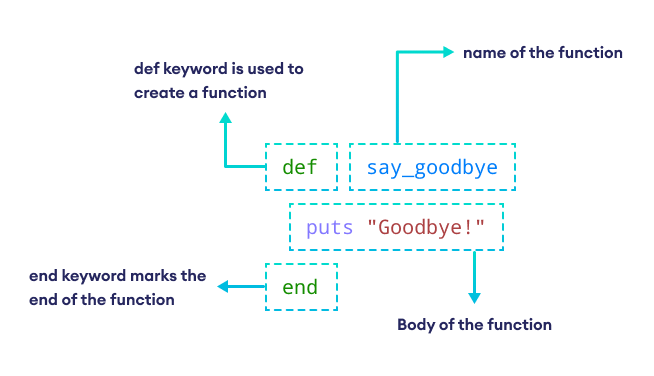A method in Ruby is a set of instructions grouped together to perform a specific task.
Here's a simple example of methods. You can read the rest of the tutorial to learn more.
Example
# Define a method named 'greet'
def greet
puts "Hello"
end
# Call the method
greet
# Output: Hello
Here, greet is a method that prints "Hello" when called.
Defining a Method
To create a method in Ruby, you use the def keyword followed by the method name.
def method_name
# Code to run
end
You then call the method later in the code by using the method name:
# Call the method to execute it
method_name
Example
Let's create a method named say_goodbye and call it for execution:
def say_goodbye
puts "Goodbye!"
end
# Call the method
say_goodbye
# Output: Goodbye!
Here, we created a method named say_goodbye that displays a message. The method is only executed when we call it later in the program.
The image below shows how the method is defined:

Method Parameters
Methods can accept inputs, known as parameters, to perform tasks based on different values.
def method_name(parameter)
# Use the parameter
end
Example: Method Parameters
def greet(name)
puts "Hello, #{name}!"
end
greet("Alice")
greet("Ruby")
Output
Hello, Alice! Hello, Ruby!
Here, the method greet takes a parameter name. Then, we called the method by passing "Alice" and "Ruby" as values to the parameter.
Here's how this program works:
| Method Call | Parameter Value | Method Output |
|---|---|---|
greet("Alice") |
"Alice" |
Hello, Alice! |
greet("Ruby") |
"Ruby" |
Hello, Ruby! |
Default Parameters
In Ruby, default parameters allow you to assign a default value to a method argument.
So, if you call the method without providing an argument, Ruby will use the default value. For example,
# Method with a default parameter
def greet(name = "Guest")
puts "Hello, #{name}!"
end
# Call method without passing an argument
greet
# Call method by passing an argument
greet("Alice")
Output
Hello, Guest! Hello, Alice!
Here, the parameter name has a default value "Guest". We then called the method twice — first without passing an argument, and then by passing an argument.
Here's how this program works:
| Method Call | Argument Value | Method Output |
|---|---|---|
greet |
"Guest" |
Hello, Guest! |
greet("Alice") |
"Alice" |
Hello, Alice! |
Calling Methods
In Ruby, there are two ways to call a method, depending on whether it has parameters or not.
Calling a method without parameters
If the method doesn't take any input, you can call it just by writing its name. For example,
def greet
puts "Good Morning"
end
greet
# Output: Good Morning
Calling a method with parameters
If the method requires input (parameters), pass the values inside parentheses. For example,
def greet(name)
puts "Hello, #{name}!"
end
greet("Sam")
# Output: Hello, Sam
Note: You can call methods without parentheses in Ruby, like greet "Sam", but using parentheses (e.g., greet("Sam")) is clearer and recommended.
Return Values
You can use the return keyword to send a result back from a method. For example,
def add(a, b)
return a + b
end
puts add(2, 3)
# Output: 5
Here, the method returned the sum of a and b, which is 5.
Note: Methods can return values of different types, like strings, numbers, booleans, etc. They can also return no value, like the greet method we previously coded.
Implicit Return in Ruby
If you omit the return keyword, Ruby will still return the result of the last executed line in the method. For example,
def add(a, b)
a + b
end
puts add(2, 3)
# Output: 5
Here, Ruby automatically returns a + b even if return is not written. This is known as implicit return.
Method Scope
The scope of a method is that part of the program where the method and its variables can be used.
For now, just remember these two important things:
1. A method cannot access local variables defined outside it.
# Variable defined outside the method
name = "Alice"
def greet
# Attempt to access name variable
puts "Hello, #{name}!"
end
greet
Output
NameError: undefined local variable or method 'name' for main:Object#greet
Here, the name variable is defined outside the greet method. So, trying to access that variable inside greet will result in an error.
2. A method's local variables only exist inside the method.
def greet
name = "Alice"
puts "Hello, #{name}!"
end
# Invalid: 'name' variable only exists inside greet method
puts name
Output
NameError: undefined local variable or method 'name' for main
Here, the name variable is defined inside the greet method. So, the variable only exists inside the scope of greet.
That's why trying to access name outside greet will result in an error.
Frequently Asked Question
Ruby follows some common naming conventions for maintaining clean and consistent code:
- Method names are written in
snake_case, likesay_helloorcalculate_total. - Avoid starting method names with an uppercase letter, as those are used for classes and constants.
Ruby also uses special characters at the end of method names for specific meanings:
- A method ending with a
?, likeempty?oreven?, usually returns atrueorfalsevalue. - A method that ends in
!(likesort!) usually modifies the object it's called on. Use them carefully!